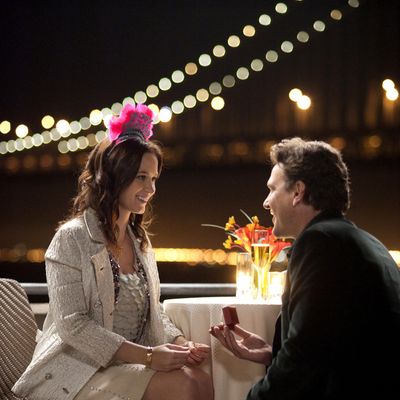
The charming, funny, reactionary mating comedy from the Judd Apatow factory, The Five-Year Engagement, is about a rising San Francisco chef, Tom (Jason Segel), who sets aside his career to relocate to a distant, less desirable city (Ann Arbor, Michigan) after his fiancée, Violet (Emily Blunt), is accepted into a prestigious academic program — and then feels his manhood slipping away. Trudging home after a faculty party in which Tom largely talks to other spouses, Violet presses him to “get weird” with her on a mound of snow, to which he replies that the cold will make his dick even smaller than it is. When he finally takes the leap, he lands on a buried fire hydrant and injures his hip — at which point Violet calls him an “old man.” Aging, shrinking, nominally employed: That’s what a fella can expect when he puts his woman first.
An unfair reading? No, it’s pretty explicit. Directed by Nicholas Stoller from a script he wrote with Segel (they collaborated on Forgetting Sarah Marshall, which also draws attention to Segel’s weiner), The Five-Year Engagement has a tidy scenario. Tom and Violet agree to marry as romantic fireworks erupt over San Francisco Bay; their coming nuptials are celebrated at a country inn with the usual nutty family toasts; Violet searches for a wedding venue; and then, suddenly, comes the news that she has been accepted into the University of Michigan’s social psychology department. Drinking heavily to ease her jitters, she tells Tom that her mother (Jacki Weaver) gave up a career to follow her father (Jim Piddock) — who later left her for a twentysomething woman. Violet doesn’t want to go that route, and why should she? Times have changed. Better to put off the wedding and pull up stakes. The problem is that once Tom hits the Midwest (which is not portrayed as a bastion of culture), this onetime culinary star is reduced to making sandwiches at Zingerman’s Deli. (Proprietors of other restaurants read his résumé and laugh in his face — he left San Francisco for this?) His new best friend, Bill (Chris Parnell), is a househusband who takes care of the kid, hunts, and knits puffy sweaters.
It should be said that Violet is not a stereotypical emasculating female. She actually tries very hard to support her man. It’s the situation that’s the problem. There’s a subordinate couple for contrast, Alison Brie as Violet’s excitable sister, Suzie, and Chris Pratt as Tom’s immature, pervy San Francisco assistant, Alex. At Tom and Violet’s engagement party, Suzie finds Alex repulsive — but they drunkenly hook up, she gets pregnant, and, like the protagonists of Apatow’s Knocked Up, they end up as a unit, with Alex taking Tom’s place as San Francisco’s new star chef. Suzie didn’t sweat the small stuff, like a career or the suitability of her mate. She took the plunge that her sister couldn’t take, made babies, and is now snug and happy.
Apart from that, Mrs. Lincoln, it’s an enjoyable film. It’s longer than two hours, but mainly because Stoller is indulgent: He gives his supporting actors lots of time to show off their tricky rhythms. (The movie is all TV-style close-ups.) Brie — who plays both Trudy Campbell on Mad Men and Annie on Community and seems poised to become a household name (not just because it’s also a cheese) — has a high adorable-ditz quotient, and Chris Pratt of Parks and Recreation has more than enough sweetness to compensate for his character’s adolescent japes. A low-key Rhys Ifans, in glasses and with his hair swept back, is amazingly charming as Violet’s lady-killing Welsh professor, who tells her, “It’s okay to be selfish.” (We know where he wants her “selfishness” to lead.)
The stars could hardly be more likable. To prove her rom-com bona fides, Blunt blurts her lines and pulls funny faces, and what a funny, gorgeous face she has to pull. In interviews, Segel has said that he was forced to lose weight or the pairing with Blunt would seem impossible rather than just unlikely. His still-large body moves slowly, but that works for the character. Lumbering Tom is unusually likable for a man of nonaction: He can’t keep pace with his own emotions.
The Five-Year Engagement has a sweet finish, but for me it still left a bitter taste. Do Stoller, Segel, and producer Apatow think that women should be more like the main character’s sister, for whom getting knocked up in a drunken one-night stand is a blessing? If they don’t, they’ve made the wrong movie. As a capper, Violet’s social psychology experiments (the whole point behind her move to Ann Arbor) turn out to be ridiculous and lead her, in a roundabout way, to conclude that Tom, her obvious soul mate, is all wrong for her. Those five years teach Violet and Tom nothing except that waiting — and planning and thinking — is for schmucks.


